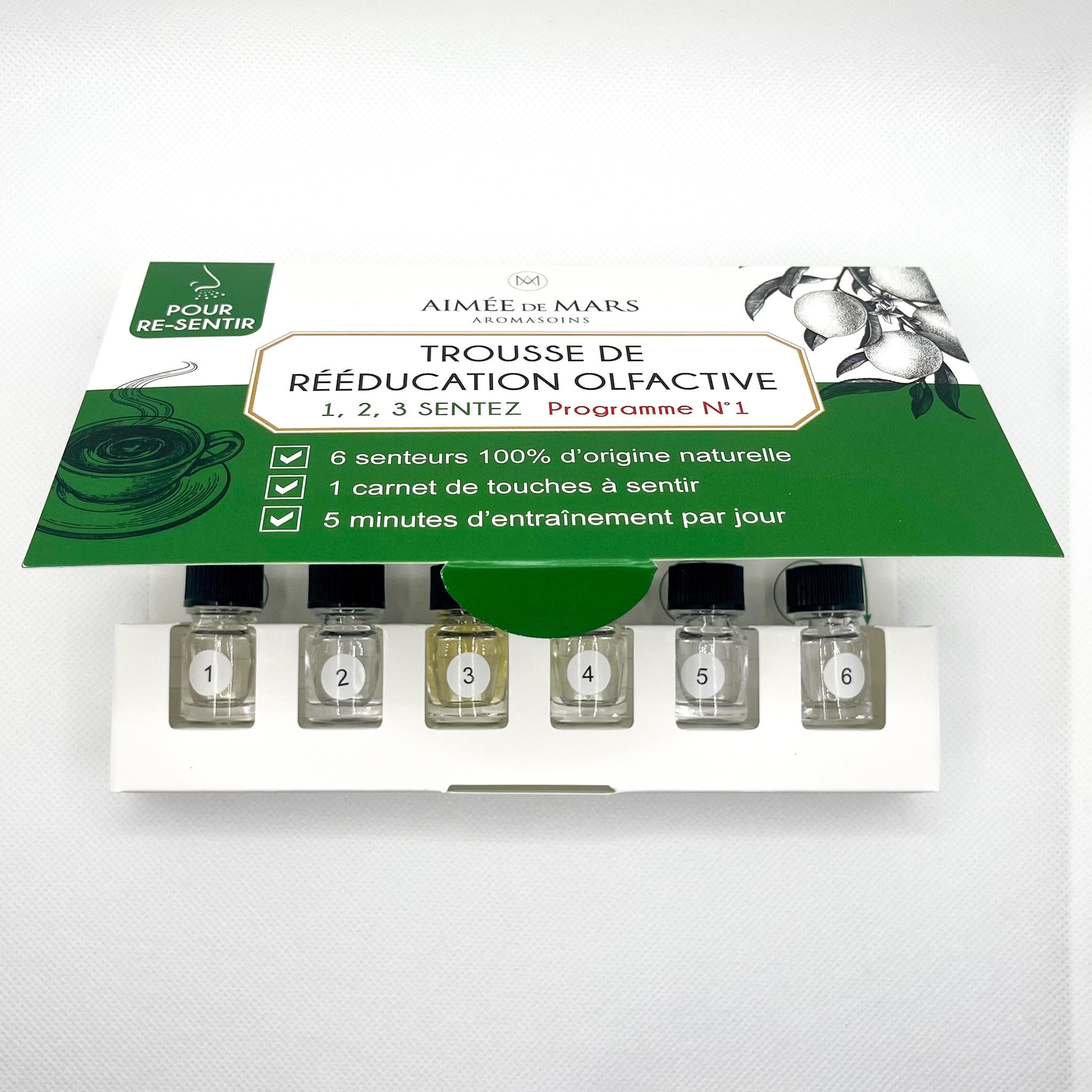
Aimée de Mars olfactory rehabilitation kit reimbursed by the innovative mutual insurance company Asetys
valérie demarsCollaboration Aimée de Mars and Asetys
We are delighted to collaborate with Asetys on our "1,2,3 SENTEZ – Olfactory Rehabilitation Kit" program, a natural treatment for smell loss. This collaboration offers the possibility of reimbursement for olfactory rehabilitation kit programs. Indeed, Asetys, as a responsible Complementary Health Insurance Provider, covers expenses related to Natural Therapies.
Asetys offers a platform dedicated to supplemental health insurance and natural prevention. Their mission is to optimize reimbursements related to health, Natural Therapies, and Wellness Practices. The Asetys network brings together practitioners and laboratories throughout France, reimbursing exclusively services and purchases of Natural Products through the Asetys Nature contract. Accessible to ages 18 to 85 without a medical questionnaire or waiting period, it reimburses up to 50% of expenses incurred for 48 disciplines of Natural Therapies and 12 families of Natural Products.
In collaboration with Asetys, we are delighted to present our innovative natural treatment "1,2,3 SENTEZ – Olfactory Rehabilitation Kit". Discover how this collaboration offers a complete solution thanks to Asetys Nature.
https://asetys.fr/asetys-nature/
1,2,3 SMELL – Olfactory Rehabilitation Kit, a natural treatment for loss of smell and anosmia
Aimée de Mars has developed two olfactory rehabilitation kit programs, designed to gradually retrain the sense of smell in cases of loss of smell or anosmia. The protocol to follow: smell one odor per day for six days, to be repeated over a period of six weeks.
Program 1 – SMELL: A step-by-step approach to recognizing everyday scents, featuring familiar scents such as Mint, Lemon, Coffee, Rose, Eucalyptus, and Orange Blossom. Use the bottle, breathe deeply, and match the scent to its corresponding number to stimulate your olfactory senses.
Program 2 - DEEPEN: For those who wish to delve deeper into olfactory rehabilitation, the second kit offers a selection of six more subtle scents: Coconut, Anise, Lavender, Vanilla, Almond, and Clove.
https://www.aimeedemars.com/collections/collection-anosmie/products/1-2-3-sentez-duo-programmes-reeducation-olfactive
What is loss of smell or anosmia?
Anosmia, the main symptom of nasal polyposis, is the loss of smell due to cell destruction and poor transmission of information to the olfactory bulb. According to a study by CNRS-INSERM (National Institute of Health and Medical Research), 1 in 10 French people suffer from olfactory disorders, reaching an extreme situation where the nose no longer perceives odors.
In the case of Covid-19, there are also forms of anosmia, with varying manifestations depending on the duration and intensity of the infection. Acute Covid infection causes olfactory disturbances in 80% of patients, while in cases of long Covid, the persistence of smell loss is around 20%, according to Dr. Georges Dib.
For patients with nasal polyps and loss of smell due to Covid, recovery occurs in 90% of patients within a month, but some may experience a slower recovery. Olfactory rehabilitation is recommended, based on research showing that stimulating the sense of smell helps regenerate olfactory receptor neurons. These rehabilitation programs begin with strong odors and gradually decrease in intensity.
Two researchers, Professors Hummel and Gurden, demonstrated 10 years ago that stimulating the sense of smell allowed the regeneration of olfactory receptor neurons. It was on the basis of their work that we created olfactory rehabilitation programs.
The effect of essential oils: cognitive enhancement
More recently, a study published in 2023 by the University of California also looked at this phenomenon using essential oils: Continuous and prolonged use has a direct effect on cognitive abilities. Participants in this study benefited from six months of nightly inhalation of essential oils while they slept. For two hours each night, an essential oil was diffused in their room. A total of seven different essential oils were used, including rose essential oil, orange essential oil, and rosemary essential oil. Their cognitive abilities increased by 226% compared to the control group.
Not only did their memory improve, but medical tests also showed positive physical changes in their brains, strengthening a region often weakened with age. The results: improved sleep, strengthened memory, and better concentration for the participants in the test group! The study demonstrates that olfactory enrichment is an effective and non-invasive way to boost our brain health and potentially fight diseases like Alzheimer's.
Olfactory Reeducation: concentration and relaxation in children.
Olfactory rehabilitation, which has become an essential tool for speech therapists working with children with ADHD or hyperactivity, has shown unanimous results in improving concentration and promoting relaxation. Children with ADHD, who are sensitive to sensory stimuli, benefit from olfactory stimulation to modulate their attention. The olfactory rehabilitation kit, used in addition to conventional therapies, offers the relaxing and rebalancing properties of essential oils, promoting calm, concentration, and thinking skills. Lavender and orange essential oils are associated with tranquility, while peppermint, known to stimulate concentration in adults, and lemon zest essential oil, which stimulates intellectual activity, offer suitable alternatives for young children.


